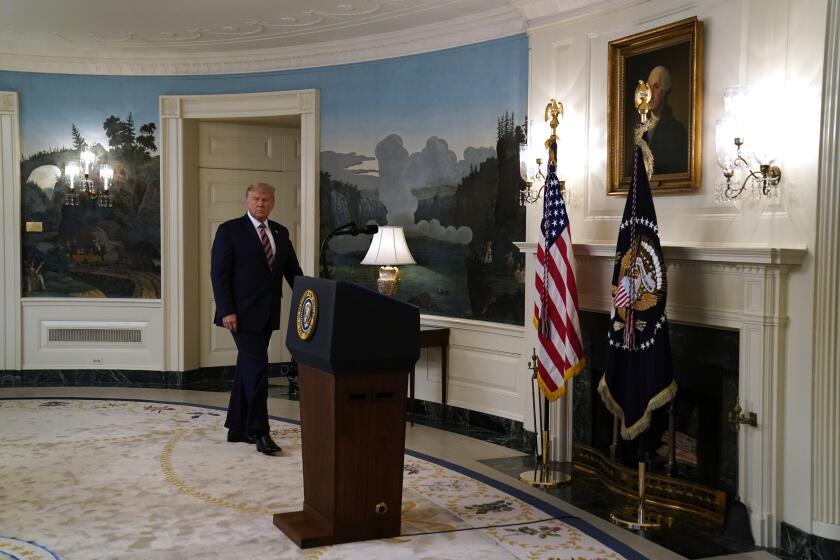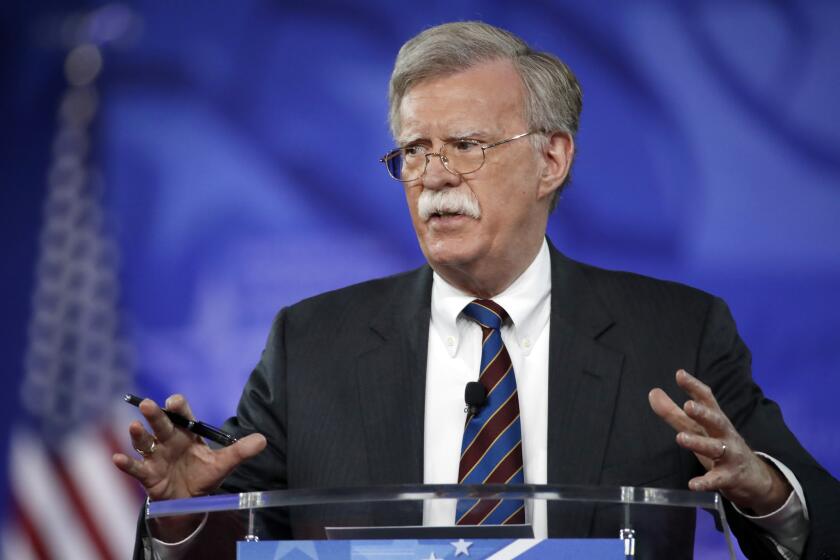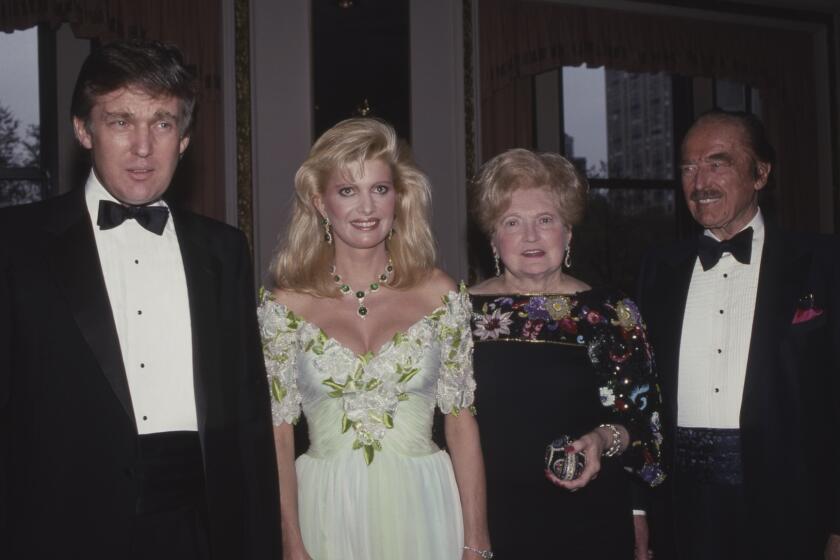Here’s to the Deep State: A CIA historian on why Trump is so much worse than Nixon
- Share via
On the Shelf
The Spymasters: How the CIA Directors Shape History and the Future
By Chris Whipple
Scribner: 400 pages, $30
If you buy books linked on our site, The Times may earn a commission from Bookshop.org, whose fees support independent bookstores.
Richard Helms, the legendary director of Central Intelligence, once described his job in chillingly succinct terms: “It’s not enough to ring the bell,” he said, referring to foreign threats. “You have to make sure the president hears it.”
It’s a tough mission statement. But the CIA’s own blunders over the years have too often made a mockery of Helms’ credo. The agency has been battered like a piñata before, but never, perhaps, as much as today, and from so many directions.
Republicans who once defended the agency against Democratic charges of secrecy and subterfuge now blast it as a “Deep State” conspirator. Democrats who once denounced the CIA as evil angrily protest GOP attacks on its independence. Meanwhile, the president’s Justice Department is investigating the CIA’s investigation of foreign interference in his election.
There’s a brave new world at Langley — and it’s captured vividly in Chris Whipple’s new book, “The Spymasters: How the CIA Directors Shape History and the Future.”
A journalist-historian, Peabody-winning TV producer and documentary filmmaker, Whipple profiled presidential chiefs of staff in his previous book, “The Gatekeepers.” “The Spymasters” illuminates the shadowy world of U.S. intelligence gathering. He spoke to The Times about how the agency and the threats have changed — from Vietnam to 9/11 to the pandemic and the Trump administration.
Richard Helms was CIA director from 1966 to 1973. Why is his admonition about ringing the bell still relevant?
It’s impossible to overstate the stakes here. The CIA director is the person we depend on to prevent another 9/11 or a lethal pandemic. For the past 50 years, they’re the ones telling presidents things they don’t want to hear. It’s not their job to advocate policy. They’re the honest brokers of intelligence.
A new Bob Woodward book says President Trump said he knew the coronavirus was deadly even as he insisted in public it posed no danger.
You’ve said President Trump is “unbriefable.” What does that mean?
He doesn’t absorb information he doesn’t want to hear. He’s incurious. He doesn’t read the President’s Daily Brief prepared for him by the director of national intelligence. But there’s a larger problem: He has contempt for the intelligence community and is convinced it’s full of enemies trying to bring him down. He’s the most extreme case but certainly not the first president who thought that.
Is President Nixon a good example?
Yes. “The Spymasters” begins with Nixon at war with his intelligence community, and Helms rebuffing his demand to help shut down the FBI investigation of Watergate. It ends with Trump getting impeached because of an anonymous CIA whistleblower in the Ukraine affair. And the outbreak of a pandemic which the president ignored.
How does Nixon’s White House compare to Trump’s?
The situation is worse now. The guys in the White House back then were almost amateurs when it came to politicizing intelligence. Nixon would blush looking at what Trump has done, and the results are sobering. Nixon resigned, Trump did not.
What’s the most disturbing thing you uncovered?
One was the lead-up to 9/11. Richard Blee, who ran the CIA’s Bin Laden unit, sounded the alarm about clues that Al Qaeda was planning to attack the United States, and he presented the case to Condoleezza Rice in July. He spoke to me on the record about this for the first time. All Rice had to do was convene a principals meeting. That’s when you bring together senior national security advisers and Cabinet officials. You shake the trees and things fall out. They would have discovered in all likelihood that two Al Qaeda hijackers were already on U.S. soil. But Rice didn’t do it. Administration officials didn’t want to deal with it. They wanted it to go away much as Trump wanted the virus to go away some 20 years later. It’s a recurring pattern of wishful disbelief. But it cuts both ways: While presidents fail to act on hard truths, sometimes the agency fails to give them the truth for fear of angering them.
Former national security advisor John Bolton skewers President Trump and White House insiders in ‘The Room Where it Happened.’
Is there a recent example?
We’re seeing evidence now that intelligence being given to the president is being skewed and soft-pedaled. A recent intelligence report said Russia is trying to interfere in the 2020 election but so are China and Iran. There’s no comparison between the Russian threat and China and Iran, who simply have a preference for who wins. The three cases were lumped together so as not to anger Trump. This is what happens when the president hands your head to you every time you tell him something he doesn’t want to hear.
Who’s the most fascinating CIA director you examined?
Helms, without a doubt. He was a flawed, complex and heroic figure all wrapped into one. He was the quintessential director — a James Bond-like character with a martini in one hand and a Chesterfield in the other. Helms fought to protect the agency’s integrity, but he also did a lot of dirty work for Lyndon B. Johnson. He was no angel. At the same time, Helms ordered up a damning report on his own authority finding that the “domino theory,” the strategic basis for the Vietnam War, was half-baked nonsense. It infuriated Johnson, but Helms was standing up for the truth.
How do you view Gina Haspel, the CIA’s current director?
The jury’s still out. The intelligence community gave her the benefit of the doubt when she started, given her track record as a covert operative and running CIA stations abroad. But now there’s a sinking feeling that she can’t stand up to Trump. No one was encouraged when she stood up at his State of the Union speech and cheered his lines. CIA directors aren’t supposed to do that. She’s trying too hard to please the president — but she’s not the first director to do that.
What was the most challenging part of writing “The Spymasters”?
Getting directors to open up. Not only are they loath to talk about conversations with presidents; much of what they do is classified. Yet I quickly learned that what some directors consider off limits, others regard as fair game. It’s no wonder the spy world is called “a wilderness of mirrors.”
How tough is the job of CIA director?
If you’re not prepared to make life-and-death decisions every day, if you’re not ready to face ethical dilemmas every day, you shouldn’t be running the agency. The job has changed over the years, but one thing remains constant. The CIA director commands an army of analysts, operatives and drones. But if he or she doesn’t have the ear of the president, the whole enterprise is for naught.
The President’s “only niece,” clinical psychologist Mary Trump, portrays a man warped by his family in “Too Much and Never Enough.”
Getlin is a former national correspondent for The Times.
More to Read
Sign up for our Book Club newsletter
Get the latest news, events and more from the Los Angeles Times Book Club, and help us get L.A. reading and talking.
You may occasionally receive promotional content from the Los Angeles Times.













